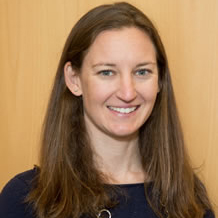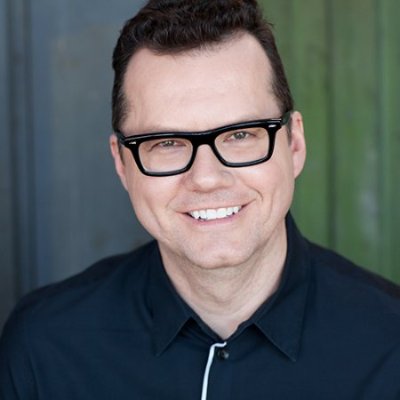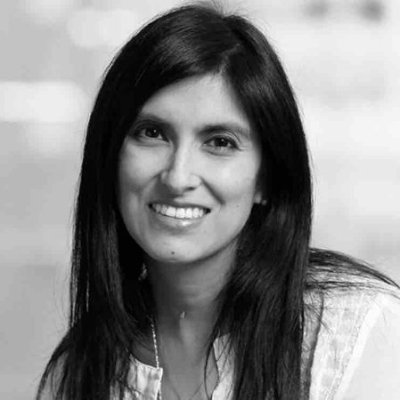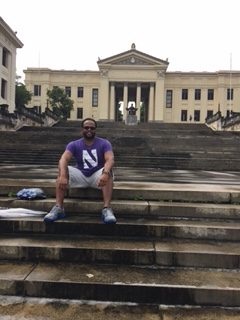 Alexis Lauricella’s research examines the impact of media technology on children and adolescents with a focus on the educational potential of media experiences. She has conducted survey research that studies parents’ and teachers’ attitudes towards young children’s media use and she is currently studying the effects of food marketing on children under the age of 12. She is also the founder of www.PlayLearnParent.com, a website dedicated to translating child-development research for parents.
Alexis Lauricella’s research examines the impact of media technology on children and adolescents with a focus on the educational potential of media experiences. She has conducted survey research that studies parents’ and teachers’ attitudes towards young children’s media use and she is currently studying the effects of food marketing on children under the age of 12. She is also the founder of www.PlayLearnParent.com, a website dedicated to translating child-development research for parents.
Lauricella taught at Georgetown as a graduate student and her work there was interdisciplinary, focusing on communication and media. It is her second year teaching for Northwestern MSC.
Can you talk a little bit about the MSC class you teach and the main takeaways for students?
I teach a research methods class, which is something I was really excited about and believe is a very important class to take. Teaching students how to read and apply research is something I’m really passionate about on the graduate and undergraduate level.
My class is very applied and industry focused. There’s a lot of attention on how to interpret reports of research to understand what really happened and to use and communicate that wisely. For example, knowing how to conduct market research other organizations would want to use, as well as how to approach your boss with ideas of doing research in the best possible way.
The research methods class is only for the international students, so it’s definitely a unique subpopulation and a really good learning environment for me. I study children’s media in the U.S., so I learn a whole lot about other cultures and countries. For example, a lot of my adolescent work is on Facebook, which is not used in places like China.
How did you get into this part of communications (research methods)?
I’m a developmental psychologist by training, so research methods were very much a key focus and something I really liked. I study children and how they learn and use media. When studying children, you have to be very creative in methodologies. For example, surveys aren’t the best for toddlers. Similarly, I feel that parents and health practitioners get too much of their research from the news and press articles, and then use those findings wildly. I believe it’s really important for everyone to understand the research methods that are behind the findings they rely on. I focus on this applied concept in my undergraduate and graduate class. For example, how far you can expand findings based on the way a study was conducted or how to put pieces back together backward as a consumer of research.
Is there a difference between MSC students and the undergraduate students you teach?
In my undergraduate class, it is often students’ first exposure to research methods. So it has more of an academic bend, along with a very applied focus.
In my MSC class, the curriculum is more industry focused. Many MSC students have already had a research course, so expectations are higher and more challenging. I definitely encourage students to pick topics that are relevant to them. A lot of students in my MSC class are still working, so I want students to target their research for a proposal they can give a new employer or related to an industry they are working in.
What would you say is the difference between organizational/industrial research and academic research?
I study children’s media, so often times TV producers and app or toy producers want research to back up claims that their app works. Often those research projects are turned around pretty quickly, whereas most of our national science grants are 3 to 5 year grants. So the time frame is big limitation for industry relevant research.
You’re also asking different research questions in those two environments. With products or industry, you know who your audience is and who you’re communicating your research to. Thus, you don’t necessarily need a diverse population or sample. With academic research, you have to start from scratch to identify these people.
What makes Northwestern MSC different from other Masters in Communications programs?
Northwestern MSC is a professional program for people who want to learn timeless concepts relatively quickly and use them in whatever field they are in or want to enter. The faculty is very strong and the staff is extremely organized. Plus, the students get an interesting and diverse set of classes and experiences.
Any interesting and unique research or projects that you have been working on through the program?
We are doing work for Common Sense Media, an organization and big research hub that focuses on educating parents and educators.
We are currently leading research for them from start to finish. So we’re developing the questionnaire, working with the survey company, doing the analyses, and writing the report once the data comes in. They are creating a large nationally representative survey of parents of age eight to 18 with the purpose of understanding parent perspectives of youth media use. We want to understand the larger context of media use at home and what parents do about it.
We also collaborate with groups that take our descriptive research and do something more applied with it. We’ve been working with Anne Marie Piper, who does human computer interaction research and works with computer scientists who develop applications.



 Adriana currently works as a consultant at
Adriana currently works as a consultant at  Alexis Lauricella’s research examines the impact of media technology on children and adolescents with a focus on the educational potential of media experiences. She has conducted survey research that studies parents’ and teachers’ attitudes towards young children’s media use and she is currently studying the effects of food marketing on children under the age of 12. She is also the founder of
Alexis Lauricella’s research examines the impact of media technology on children and adolescents with a focus on the educational potential of media experiences. She has conducted survey research that studies parents’ and teachers’ attitudes towards young children’s media use and she is currently studying the effects of food marketing on children under the age of 12. She is also the founder of  and I thought that this would be a great opportunity to take part in on my father’s Legacy and 10th anniversary of The Joe “Butch” Martin Fund. During my winter break from Graduate school at Northwestern, I decide to create a Humanitarian project where I would visit a world unknown. It was kind of scary because going to Cuba was so new, and no one knew what I needed to do, and I didn’t know what to expect while I was there. If It wasn’t for my high school counselor at E.T.H.S Roz Pollack, a NU alumni, who guided me to the right people, they were able to take care of me from the beginning to the end of the trip. Being in Cuba, my experience was like I was a native, even though I was a tourist. I learned so much about what life was like there and how living there seemed as if you stepped back in time. I couldn’t believe how much Spanish I understood while not practicing for years. I hope Cuba gets everything they need to restore a country that ha een without for so long. Cuba was defiantly a great experience and I hope to go back in the future. I also hope many of you go and visit and see how you can help Cuba too. This humanitarian trip to Cuba was an inspiration with the help of our family fund The Joe “Butch” Martin Fund managed by the Evanston Community Foundation. My Family linked up with Th EFC after my father died because we wanted to do something to honor him and help the Evanston Community. I am glad the foundation was able to help with the process of entering Cuba and help our family fulfill our global responsibility. As a graduate student, I wanted to visit the University of Havana to see what others student’s campus life was like. At Northwestern, we are so fortunate to have so many resources and a world renounced education. The experience was moving to see other student fulling their dreams to have a great education as well. I was also able to donate some items to the people of Cuba, through my sister and Oakton Community College, which they were thrilled to receive as well.
and I thought that this would be a great opportunity to take part in on my father’s Legacy and 10th anniversary of The Joe “Butch” Martin Fund. During my winter break from Graduate school at Northwestern, I decide to create a Humanitarian project where I would visit a world unknown. It was kind of scary because going to Cuba was so new, and no one knew what I needed to do, and I didn’t know what to expect while I was there. If It wasn’t for my high school counselor at E.T.H.S Roz Pollack, a NU alumni, who guided me to the right people, they were able to take care of me from the beginning to the end of the trip. Being in Cuba, my experience was like I was a native, even though I was a tourist. I learned so much about what life was like there and how living there seemed as if you stepped back in time. I couldn’t believe how much Spanish I understood while not practicing for years. I hope Cuba gets everything they need to restore a country that ha een without for so long. Cuba was defiantly a great experience and I hope to go back in the future. I also hope many of you go and visit and see how you can help Cuba too. This humanitarian trip to Cuba was an inspiration with the help of our family fund The Joe “Butch” Martin Fund managed by the Evanston Community Foundation. My Family linked up with Th EFC after my father died because we wanted to do something to honor him and help the Evanston Community. I am glad the foundation was able to help with the process of entering Cuba and help our family fulfill our global responsibility. As a graduate student, I wanted to visit the University of Havana to see what others student’s campus life was like. At Northwestern, we are so fortunate to have so many resources and a world renounced education. The experience was moving to see other student fulling their dreams to have a great education as well. I was also able to donate some items to the people of Cuba, through my sister and Oakton Community College, which they were thrilled to receive as well.
